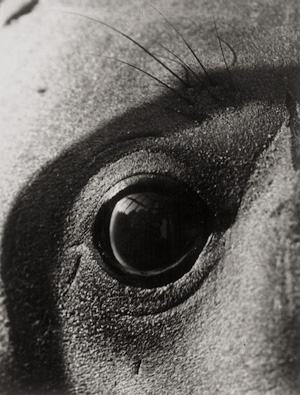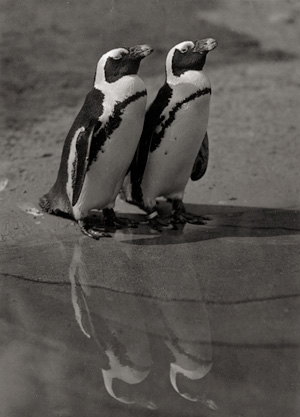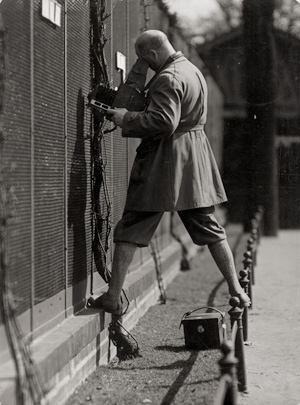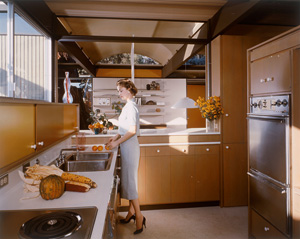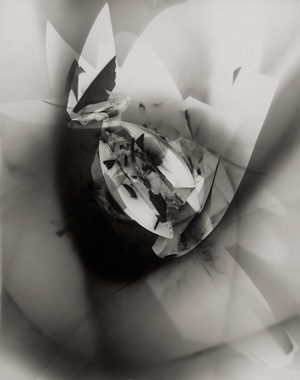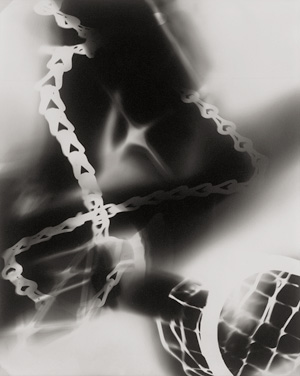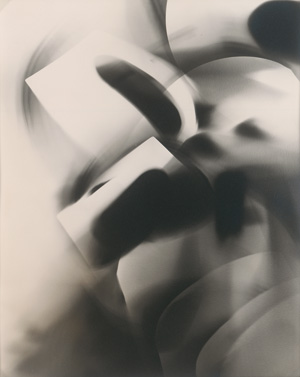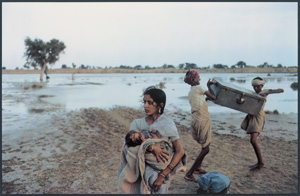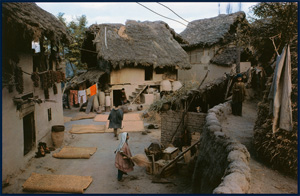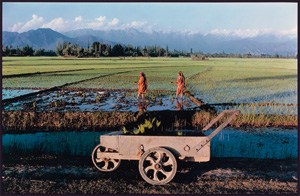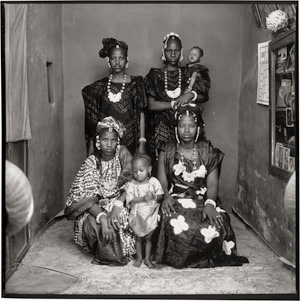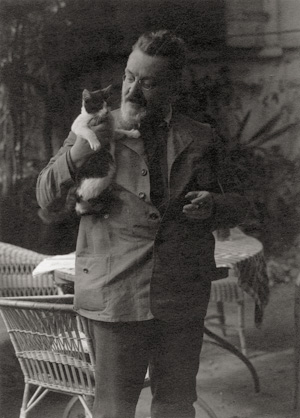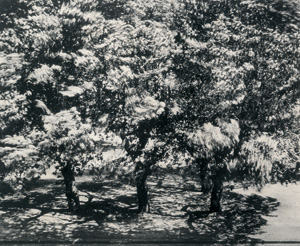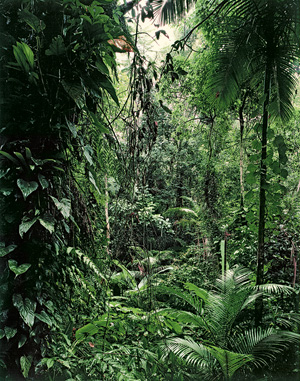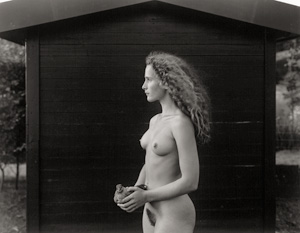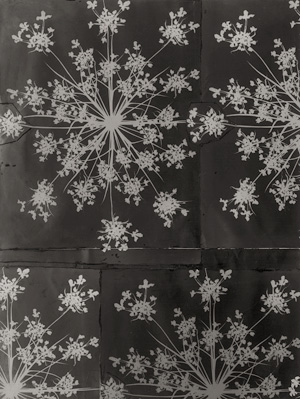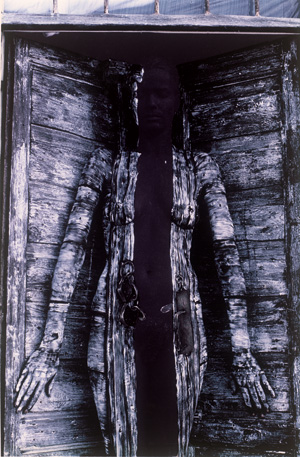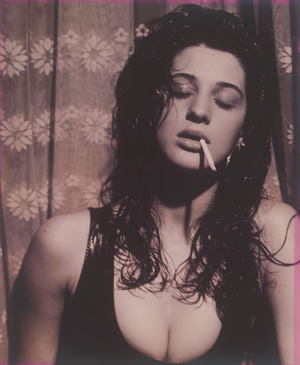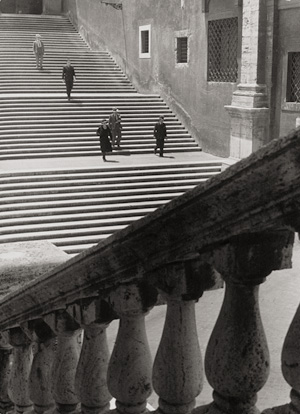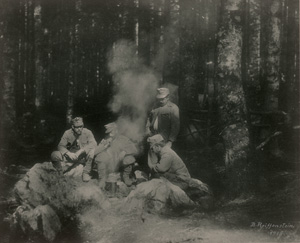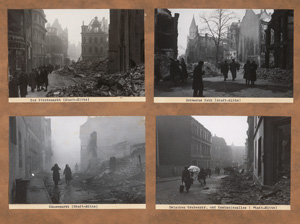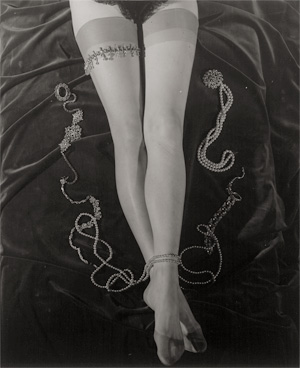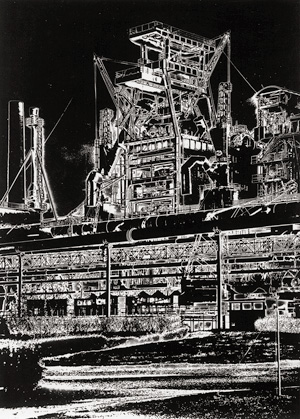Elephant seal. Circa 1927. Vintage gelatin silver print mounted to board. 29 x 22,5 cm (40 x 30 cm). Photographer's studio stamp on verso.
Minimal buckling and light scuff marks otherwise in near excellent condition.
Lit.: Berlinische Galerie, Landesmuseum für Moderne Kunst, Fotografie und Architektur (ed.). Friedrich Seidenstücker. Von Nilpferden und anderen Menschen. Fotografien 1925-1958, ill. p. 135.
African penguins. 1930s. Vintage gelatin silver print mounted to board. Circa 19 x 14 cm. Photographer's studio stamp and copyright information on the verso, annotated in pencil on verso of board.
Some scuff, pressure marks and handling creases, otherwise in good condition.
Lit.: Bruno Schultz/Graf von Santeul, eds. Das Deutsche Lichtbild: Jahresschau 1935. Berlin: Bruno Schultz Verlag, 1935, ill. p. 106.
Seidenstücker, Friedrich
The actor and photographer Julius Arnfeld at work at the Berlin Zoo
Los 4275
Ergebnis (inkl. Aufgeld) *
375€ (US$ 426)
The actor and photographer Julius Arnfeld at work at the Berlin Zoo. 1930s. Vintage gelatin silver print. 18 x 13 cm. Photographer's studio stamp and annotated in pencil on verso.
Julius Arnfeld began his career as an actor, working at various theaters. In Breslau he directed at the Lobe Theater, among others, where he supported the young Heinz Rühmann. As a Jewish artist, he was banned from working in 1933, so he tried to survive as a photographer, with little success. In 1942 he was deported to the Theresienstadt ghetto. He survived the camp, but he sadly suffered the loss of his murdered family. – Edges rubbed, some scuff marks and creases, otherwise in good condition.
Lit.: Berlinische Galerie, Landesmuseum für Moderne Kunst, Fotografie und Architektur (ed.). Friedrich Seidenstücker. Von Nilpferden und anderen Menschen. Fotografien 1925-1958, compare ill. p. 107.
Shulman, Julius
Case Study House #20, Altadena, California
Los 4278
Ergebnis (inkl. Aufgeld) *
5.000€ (US$ 5,682)
Case Study House #20, Altadena, California. 1958. Chromogenic print, printed later. 40,5 x 51 cm (50,8 x 61 cm). Signed and dated "Julius Shulman 1958" by the photographer in felt-tip pen on verso.
Julius Shulman was a key figure in architectural photography, known for capturing the beauty and functionality of mid-century modern design with precise composition and natural light. His work was instrumental in popularizing the modernist movement, particularly in Southern California. This photograph exemplifies his style, featuring a sleek, functional kitchen that embodies the clean lines and optimistic design ideals of post-war America. – Lower left corner bumped, some handling creases and scratches on surface of print in lower right, otherwise in good condition.
Abstraction, Crystals. 1946. Vintage, unique large-format gelatin silver print on ivory paper. 35,2 x 27,8 cm. Signed and dated in pencil on verso, mounted in mat.
Arthur Siegel began photographing as a youth in the mid-1920s. He studied at the University of Michigan before enrolling at the New Bauhaus at the Armour Institute, where he studied under the school's founder, László Moholy-Nagy, and György Kepes until 1938. Siegel then worked as a photojournalist for the New York Times and took journalism assignments for several decades. His photography was featured in numerous major exhibitions, including two solo shows at the Art Institute of Chicago and as part of the Image of America exhibit at the Museum of Modern Art. Siegel was known for his experimental use of color techniques, and from the 1950s onward, he often explored abstract uses of color as a form of expression. – Minimal edge wear, a few creases in lower area and upper right and left areas, otherwise an attractive large print in good condition.
Provenance: Christie's. Light, Volume and Form: Photographs from the Shalom Shpilman Collection, May 24-June 2, 2016, lot 69.
Photogram #7. 1949. Vintage unique gelatin silver print. 25,2 x 20,2 cm. Mounted in mat.
Minimal mirroring in dark areas, only visible at an angle, otherwise in very good condition.
Provenance: Phillips de Pury, New York, The Collection of Joshua P. Smith, October 16, 2003, Lot 128.
Bruce Silverstein Gallery, New York.
Christie's. Light, Volume and Form: Photographs from the Shalom Shpilman Collection, May 24-June 2, 2016, lot 70.
Untitled (photogram). 1949. Vintage unique gelatin silver print. 25,3 x 20,3 cm. Mounted in mat.
Light dent in right mid-section near edge, small surface rubbed spot in upper left, otherwise in very good condition.
Provenance: Bruce Silverstein Gallery, New York.
Christie's. Light, Volume and Form: Photographs from the Shalom Shpilman Collection, May 24-June 2, 2016, lot 71.
Singh, Raghubir
After Crossing the Luni River, Barmer, Rajasthan
Los 4282
Ergebnis (inkl. Aufgeld) *
1.500€ (US$ 1,705)
"After Crossing the Luni River, Barmer, Rajasthan". 1975/printed circa 1985. Dye transfer print. 24,2 x 37,2 cm (43,5 x 55 cm). Unsigned, with printer's stamp and signed by the printer in pencil on the verso.
From an aristocratic Rajput family in Jaipur, Raghubir Singh had his initial encounter with photography as a student when he came across Henri Cartier-Bresson's 1948 book, Beautiful Jaipur. This discovery ignited his passion for photography, leading to a remarkable body of work that captures the essence of Indian culture and the evolving landscapes of the country. Today, Singh holds a prominent place in the history of early color photography, alongside celebrated photographers like William Eggleston, Stephen Shore, Joel Sternfeld, and Joel Meyerowitz. He has published more than fourteen books on India and received numerous international awards. A print of this image is in the Metropolitan Museum of Art, New York. – A fine print in very good condition.
India, Kashmir. Circa 1978/printed circa 1985. Dye transfer print. 24 x 37 cm (43,5 x 55 cm). Unsigned, with printer's stamp and signed by the printer in pencil on the verso.
A fine print in very good condition.
India, Kashmir. Circa 1978. Dye transfer print, circa 1985. 24,5 x 37,5 cm (42 x 55,5 cm). Unsigned, with printer's stamp and signed by the printer in pencil on the verso.
A fine print in very good condition.
Yoruba women. 1984. Gelatin silver print on baryta paper. 41 x 40,5 cm. Photographer's copyright stamp in red ink and annotated by another hand in pencil on verso.
Tijani Àdìgún Sìtou was a distinguished West African photographer whose work, though less internationally known, ranks him among mid-20th century figures like Seydou Keïta and Malick Sidibé. Sìtou documented the cultural richness and social dynamics of his Yoruba heritage, capturing portraits that reflect dignity, pride, and familial bonds. Gaining wider recognition in the 1990s, his work provides a nuanced, authentic perspective that enriches the visual history of West African culture and complements the broader narrative of African photography. – In excellent condition.
Slevogt, Max
Portraits of the painter Max Slevogt
Los 4286 [*]
Ergebnis (inkl. Aufgeld) *
750€ (US$ 852)
Photographer unknown. Portraits of the painter Max Slevogt. Mid-1920s-1932. 8 vintage gelatin silver prints. Between 12,5 x 9 cm and 20,5 x 16,5 cm.
Max Slevogt was a renowned German painter and printmaker celebrated for his contributions to Impressionism and later explorations of Expressionism. His vibrant, atmospheric works often depict landscapes, gardens, and scenes of leisure, capturing the interplay of light and color. Slevogt, a key figure in the Berlin Secession, played a central role in shaping early 20th-century German art. The accompanying photographs capture intimate moments of his life, including him painting outdoors, close-up portraits, a bust of the artist, and his funeral procession, offering a poignant glimpse into his legacy. – Small scratch on one print, another with silver mirroring in edges, otherwise all in good to very good condition.
Steinert, Otto
Die Bäume vor meinem Fenster II
Los 4287
Ergebnis (inkl. Aufgeld) *
3.250€ (US$ 3,693)
Die Bäume vor meinem Fenster II. 1956. Gelatin silver print on ivory paper. 14,3 x 17,7 cm (18 x 22 cm). Signed below image in brown ink (slightly faded), with the photographer's copyright stamp on the verso.
Otto Steinert was a German photographer and key figure in the Subjektive Fotografie movement, known for using experimental techniques to express emotional and abstract ideas rather than objective reality. His work, characterized by high contrast, multiple exposures, and unconventional angles, explores themes of light, shadow, and form, often blurring the boundary between photography and modern art. Steinert’s influence reshaped post-war European photography, encouraging a more personal, subjective vision that celebrated artistic experimentation. – Corners slightly bumped, some traces of previous mounting on verso, otherwise in near excellent condition.
Paradies series. 2004. 5 digital color prints and 1 black and white digital print. Each circa 30,7 x 39 cm and 39 x 30,7 cm (33,4 x 48 cm and 48 x 33,4 cm). Each with "Griffelkunst" edition text printed on the verso. Each mounted in upper edge to archival board, with original card portfolio, inner flap signed by the photographer in pencil and with text page.
Thomas Struth’s Paradies series, created between 2000 and 2002, explores the relationship between humans and nature through large-scale photographs of botanical gardens, parks, and tropical settings. By capturing the lush beauty of these environments and the interactions of people within them, Struth invites viewers to reflect on the balance between humanity and nature, as well as the idealized notions of paradise in contemporary society. The titles in this portfolio include Juquehy, São Francisco de Xavier, Yakushima, Daintree, Xi Shuang Banna and Yosemite National Park. – One print with a few small color irregularities, otherwise in excellent condition.
Lit.: Thomas Struth. New Pictures from Paradise. Dresden 2002.
Sturges, Jock
Danielle, Oud Heusten, the Netherlands
Los 4289
Ergebnis (inkl. Aufgeld) *
938€ (US$ 1,065)
Danielle, Oud Heusten, the Netherlands. 1993. Gelatin silver print. 28 x 35,4 cm. Signed, titled, dated, copyrighted and editioned "6/10" by the photographer in pencil on the verso.
One minimal handling dent near upper edge, otherwise a fine tonal print in excellent condition.
Lit.: Jock Sturges. Radiant Identities. New York 1994, ill. p. 58-59.
Design for wallpaper. 1930-31. Vintage unique ferrotyped gelatin silver print collage. 49,5 x 38,5 cm. Mounted to board (some wear, time-stained in edges), photographer's estate stamp and number "863" in red crayon on mount verso.
Between 1929-1931, Elsa Thiemann’s formative years at the Bauhaus in Dessau were shaped by influential teachers such as Josef Albers, Joost Schmidt, and most notably Walter Peterhans, who guided her in photography. Her artistic development was heavily influenced by the New Objectivity movement and the emphasis on advertising photography in her Bauhaus education, fostering her appreciation for structure and innovative composition. In 1930, she met her future husband, painter Hans Thiemann. After completing her studies, Elsa returned to Berlin in 1931 and pursued a career as a freelance press photographer until 1960, when she moved to Hamburg with her husband, who had been appointed a professor at the Hochschule für Bildende Künste. – Some retouched spots, a few light surface scuff marks, some pressure marks from mounting and some edge wear in individual prints, photos lifting off of mount in some areas, some mirroring in edges and corners, otherwise in good condition.
Provenance: From the estate of the photographer
Lit.: Annemarie Jaeggi/Margot Schmidt (eds.). Elsa Thiemann: Fotografin. Bauhaus und Berlin. Berlin 2004, see pp. 18-27.
Trülzsch, Holger and Vera Lehndorff
Geöffnete Haustüre, Paros
Los 4293
Ergebnis (inkl. Aufgeld) *
750€ (US$ 852)
Geöffnete Haustüre, Paros.1977. Dye transfer print, printed 1979. 21 x 27 cm (57,5 x 48,5 cm). Signed, titled, dated and numbered "49/75" in pencil as well as artists' copyright stamp on verso.
The German photographer and painter Holger Trülzsch collaborated with the internationally celebrated supermodel Vera "Veruschka" Lehndorff to produce a diverse and compelling body of work during the 1970s and 80s. The highlighted pieces are drawn from their collaborative body-art project titled "Trans:figurations." These images prominently feature the colors of oxidation, such as rust, soot, and chalk, which are beautifully rendered in the dye transfer prints. – Slight buckling in upper portion, light pen mark and surface soiling in lower margin, otherwise in very good conditon.
Lit.: Lehndorff & Trülzsch, Veruschka, Trans-figurations, Bullfinch Press, 1988.
Oxydationen. Vera Lehndorff & Holger Trülzsch. Museum für Kunst und Gewerbe Hamburg 1979.
Voigt, Adolf & Hans Giebler
Surface of the Moon
Los 4294 [*]
Ergebnis (inkl. Aufgeld) *
2.500€ (US$ 2,841)
Surface of the Moon. 1964-1968. 30 vintage gelatin silver prints. Each 21 x 21 cm. Each with detailed information on the photograph's date, moon phase and location printed onto label on verso.
The collaborative lunar photography project by Adolf Voigt and Hans Giebler was instrumental in astronomical observation during the height of the space race. Using the 12-inch Bamberg-Refractor telescope at the Wilhelm Foerster Observatory, they captured detailed images of the moon’s surface with a custom-built camera, meticulously documenting its various phases. Conducted shortly before the Apollo 11 moon landing, their work not only provided valuable visual records but also heightened public interest in lunar exploration during this pivotal era in space history. – Some very light surface scuff marks and finger prints, otherwise in excellent condition.
Rio de Janeiro. 1986. 2 gelatin silver prints mounted to mat. Each approximately 43 x 36 cm (49.7 x 42 cm). Each print signed, dated, titled, and numbered in pencil on verso; titled, dated, numbered, and annotated in pencil on mat.
Bruce Weber's photographic practice is characterized by vivid and sensuous imagery, blending elements of fashion, portraiture, and documentary styles. His distinctive use of black and white photography captures subjects with an intimate, nostalgic, and often homoerotic aesthetic that has become iconic in both commercial and fine art photography. Frequently exploring themes of youth and natural beauty, Weber has made significant contributions to major fashion campaigns and publications. – Some discoloration, some silver mirroring along edges of one print, otherwise in good condition.
Rome. 1940s. Vintage ferrotyped gelatin silver print on doubleweight paper. 23,7 x 17,2 cm. Photographer's Frankfurt am Main stamp, annotated in pencil and subject and agency label on the verso.
The German photographer Dr. Paul Wolff is best known for his pioneering work in portraiture and modern photographic techniques. His innovative approach to lighting and composition continues to influence the medium's evolution and secures his enduring legacy in the history of photography. – Corners bumped with some chipping to emulsion, some light surface scuff marks, otherwise in very good condition.
World War I
Austrian soldiers engaged in various activities
Los 4297
Ergebnis (inkl. Aufgeld) *
500€ (US$ 568)
Aviation
Photographer: Bruno Reiffenstein (1868-1951) and unknown. Austrian soldiers engaged in various activities. 1916. 8 vintage bromoil and gum bichromate prints. Various sizes 21 x 25 cm and smaller. 1 signed by the photographer in ink in lower right corner, all but 1 mounted to board.
Bruno Reiffenstein was originally an architectural photographer. During WWI he worked for the Austrian Kriegspressequartier and produced these impressive images of Austrian soldiers during WWI. – In very good condition.
World War II
Views of destroyed Essen after bombing during WWII
Los 4298
Ergebnis (inkl. Aufgeld) *
1.500€ (US$ 1,705)
Photographer: Willy van Heekern (1898-1989, attributed to). Views of destroyed Essen after bombing during WWII. 1944/45. Circa 62 vintage ferrotyped gelatin silver prints, most 17 x 12 cm, some larger circa 32 x 12 cm. Each image with typewritten caption below photo, mounted on one side on album pages, bound in canvas album (traces of use, 30 x 43 x 3 cm).
The photographer responsible for this meticulously compiled photographic documentation is most likely Willy van Heekern. Commissioned by the regional Luftgaukommando Münster, he was tasked with documenting the destruction of Essen "by the enemy" in 1943. Each image, though often barely recognizable due to the destruction, is carefully labeled, sometimes indicating the photographer's precise location. Several photographs show smoking and burning rubble, suggesting that they were taken shortly after the bombing raids. – Some buckling, otherwise in good condition.
Provenance: Robert Lebeck Collection
Zichy, Count Theodore
Untitled (Legs with Jewelry)
Los 4299
Ergebnis (inkl. Aufgeld) *
750€ (US$ 852)
Untitled (Legs with Jewelry). ca. 1948. Gelatin silver print. 30,5 x 25,6 cm.
Count Theodor Zichy, a Hungarian aristocrat, became a distinguished figure in mid-20th-century photography, particularly in fashion and portraiture. Starting his career in the 1930s, Zichy quickly gained acclaim for his distinct style that blended elements of glamour and sensuality. His fascination with photographing women’s legs, often adorned with luxurious stockings or jewelry, became a hallmark of his work, emphasizing the aesthetic allure and subtle eroticism that defined his approach to fashion photography. – Corners bumped, some handling creases and light surface irregularities, otherwise in good condition.
Industrial images. 1960s. 5 vintage gelatin silver prints on Agfa-Portriga-Rapid paper and Agfa-Brovira paper. Each between 23,5 x 17,5 cm and 30,5 x 21 cm. 2 with photographer's stamp, 1 signed by the photographer in pencil on the verso.
Edges rubbed, a few small handling dents, surface scratches, otherwise in good condition.
[*]: Regelbesteuert gemäß Auktionsbedingungen. [^]: Ausgleich von Einfuhr-Umsatzsteuer.
* Alle Angaben inkl. 25% Regelaufgeld ohne MwSt. und ohne Gewähr – Irrtum vorbehalten.
Galerie Bassenge
Erdener Str. 5A
14193 Berlin
Öffnungszeiten:
Montag bis Donnerstag, 10–18 Uhr,
Freitag, 10–16 Uhr
Telefon: +49 30 8938029-0
Fax: +49 30 8918025
E-Mail: info (at) bassenge.com
Impressum
Datenschutzerklärung
© 2024 Galerie Gerda Bassenge
Galerie Bassenge
Erdener Str. 5A
14193 Berlin
Öffnungszeiten:
Montag bis Donnerstag, 10–18 Uhr,
Freitag, 10–16 Uhr
Telefon: +49 30 8938029-0
Fax: +49 30 8918025
E-Mail: info (at) bassenge.com
Impressum
Datenschutzerklärung
© 2022 Galerie Gerda Bassenge

